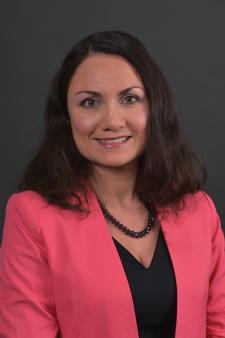Experiential learning in public relations at WMU
KALAMAZOO, Mich.—When public relations majors at WMU trade their hoodies for business casual as they cross the threshold from student to employee, they already have a briefcase full of experience before their first day on the job.
Within the School of Communication, classes are not only designed to teach students the knowledge to succeed, but to give them opportunities to apply it hands-on.
One professor leading experiential learning integration in the PR discipline is Dr. Anna Popkova, associate professor of communication. As an instructor for a range of PR classes, from introductory to the capstone, she emphasizes that experiential learning is at the heart of the major.
“The major is so applied – I don’t know how to do it without the experience piece. It’s not just one class – the whole program is structured in a way that students have multiple opportunities,” Popkova says.
A cornerstone of experiential learning within the major is the capstone course – Public Relations Campaign Development. The course is fully experience-based, simulating life at a real PR agency as students work with actual clients.
In this class, students work in teams to develop and pitch public relations campaigns for a real client assigned by Popkova—typically a local nonprofit. Past clients have included Sounds of the Zoo, the First Day Shoe Fund, and Rootead Enrichment Center.
“The point is, in PR, you have to be ready for the fact that you won’t get to choose your clients at an agency,” Popkova says. “Your boss picks the clients for you.” “
Through the simulation, students gain professional communication skills by meeting with the client, navigating challenges, developing campaign books, and pitching their final products at the end of the semester.
Throughout the process, each student takes on a specific team role to reflect how a real PR team operates. They meet periodically with their clients to discuss progress and refine their strategies before presenting their final campaign.
And at the end of the semester, all teams present their polished campaigns to the client, who provides feedback to all the teams and selects a winner. While Popkova grades students individually, the winning team earns extra recognition—and a strong addition to their resume.
The class benefits clients as well as students.
“I think the biggest boost that they get from this collaboration is they get fresh ideas, fresh perspective of what they’re doing,” Popkova says. “Working with students everyday, there’s this amazing energy. While I’m used to it, I never take it for granted. But for [the clients], it’s new, and they get this boost of optimism and hope and energy.”
The capstone class isn't the only course where PR and communication students get to make a real-world impact. In a new course taught by Popkova – Advanced Social Media Strategy – students design social media campaigns for real clients, this time choosing organizations they care about personally.
“I wanted them to pick an organization they really care about.” Popkova says. “I want them to not just be like, ‘I took this class, check mark.’ I want this to be like a springboard. They create the social media plan, but because they’re part of that organization, they can actually continue on with it and make it happen and make it part of their overall profession.”
One student, Aazonus Daniels, ‘26, has taken the capstone class and is currently in the advanced social media course.
“With a test or an assignment, it’s standardized. You know what to expect in terms of definitions and theories and concepts,” Daniels says. “It’s easy to regurgitate things back onto paper, but when you actually have a real client, you have to think more strategically about these concepts and how they apply to them...because not everything works for everybody.”
Despite challenges, Daniels was successful – her team’s plan was chosen by their client, Sounds of the Zoo.
“In terms of my social media class, it’s somewhat difficult but I always like the challenge of looking at social media in the lens of a professional and trying to utilize all social platforms, not just Instagram and TikTok, but things like BuzzFeed or X to figure out what these platforms could really do outside of personal usage.”
Through classes like these, students in WMU’s School of Communication don’t just learn about concepts in PR, social media and communication—they practice it. By the time they graduate, they leave with more than just a degree, but with confidence, creativity, and hands-on experiences to stand out in the field.
For more WMU news, arts and events, visit WMU News online.


